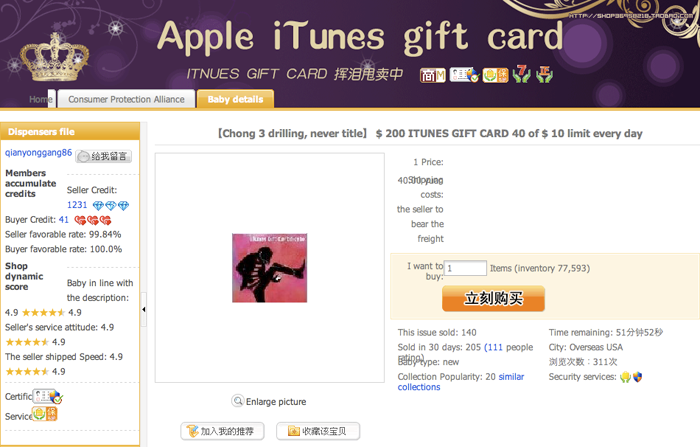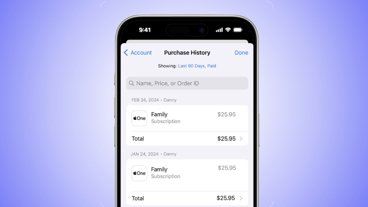AppleInsider has obtained an email sent to the developer of TiltMeter Pro, sent from an individual using a yahoo.com email account to the developer's customer support email address listed in the iTunes App Store. The email states, "I've been taking a look into your application and have an offer to you. I have many itunes gift certificates for itunes usa , canada and uk to make purchases through the itunes store. I can buy your product as many times as you want and can share earnings 50 - 50."
The scam attempts to exploit Apple's generous 70% revenue share of all iTunes mobile software purchases, which the company pays directly to developers. Counterfeiters have already mastered the algorithm used to generate fraudulent iTunes gift certificate numbers, but can only sell the fake certificates for pennies on the dollar, as few consumers are willing to pay anything significant for the opportunity to download free iTunes while incurring the substantial risk of being caught with a paper trail tied directly to their iTunes account.
One Chinese auction site attempting to sell generated iTunes gift certificate numbers listed an available inventory of over 77,000 codes valued at $200 each, but only appeared to be selling a few hundred at around two dollars each, netting just a couple hundred dollars. Using the counterfeit codes to buy apps instead, and then splitting the proceeds with developers, the scammers could easily syphon thousands of dollars from Apple's App Store without much effort.
Upping the value of counterfeit iTunes credits
For example, by setting up a thousand fake iTunes accounts, a scammer could offer to buy a thousand copies of a given iPhone application at the average $2 price each, resulting in $1,400 in fraudulent iTunes developer revenues, with the scammer offering to split the proceeds with the developer. That amount of money would be unlikely to tip off any suspicions at Apple, given that the company is now handling over 75 million active accounts, according to Phil Schiller in his January 2009 Macworld Expo keynote.
If the scammers understand how to manipulate the iTunes interface using automated tools, a likely scenario given their ability to counterfeit gift certificates, it should be easy to set up tens of thousands of virtual iTunes users, converting the low value gift certificate counterfeiting business into a much more lucrative scam that can generate tens of thousands of dollars per app with very little overhead and little risk to the scammer.
Scammers initially attempted to market illegitimate iTunes Gift Certificates one-by-one for pennies on the dollar.
The risk assumed by developers participating in the scam is much higher than the risk to the counterfeiters, however. Apple is likely to discover the purchasing patterns that tip-off sales as automated, resulting in offending developers losing their fraudulently obtained revenue and their ability to sell their work in iTunes. They would also find themselves facing criminal fraud charges in a case where the transactions were all clearly documented within the iTunes Store's transactions.
Unscrupulous developers might consider participating the scam, not just for a cut of the money but also to generate fake sales volumes for their applications, which could help push their titles up in the rankings and expose them to a much wider audience. The huge selection of mobile apps in iTunes makes it challenging for developers to get their apps to stand out; immediate, high volume sales over a short period of time can boost a new title into iTunes' top ten lists, a status which results in a huge boost in legitimate sales and far more overall purchases than an app could hope to achieve without reaching the critical mass needed to obtain front page promotion in iTunes.
SEO for iTunes apps
Developers are already working to discover Apple's secret algorithms used to calculate top sales rankings and use their advertising budgets for promotion of their apps as efficiently as possible, generating the types of sales traffic that results in immediate promotion within iTunes. iPhone developers have stated that being promoted within iTunes is far more effective in reaching new customers and generating sales than anything they can do to promote themselves.
Figuring out exactly how to push their apps into the spotlight is the hard part. At the recent iGames Summit, developers and game publishers noted that Apple operates its App Store as a level playing field ruled by "meritocracy," with iPhone app popularity based entirely upon how good the apps are and therefore how popular they become with users, rather than titles being promoted by Payola-style deals that sell titles based on how much the vendors pay to place their products.
This has been a boon for small indie developers, allowing them to compete against much larger software developers that might release titles with less originality and creativity, but also makes it difficult for anyone to game the system. There's so much money at stake that such gaming efforts are inevitable. These efforts to discover the rules at work behind the iTunes App Store are very similar to the "search engine optimization" that many companies offer to help web content producers gain favorable rankings for their websites in Google, resulting in many more visitors and therefore more ad revenue.
Like Google, Apple tries to keep its methods secret to prevent sites from exploiting loopholes and system vulnerabilities or simply gaming the system fraudulently. In online advertising and SEO, that has included doing things like creating huge arrays of fake websites that point to a promoted site in order to boost its search ranking in Google, or paying armies of low paid sweatshop workers in developing countries to click on ads that appear on a site. In Google's case, the scammer is trying to either fool the company into increasing the weight it assigns to a website based on worthless traffic, or to defraud Google and its advertisers into paying a site ad revenue for worthless ad requests.
The scam targeting the iTunes App Store does both at once, creating fake volumes of app sales and generating revenues for a developer based on counterfeit payments. The result of this fraud, however, could easily be a successful app launch that may actually generate significant and legitimate sales far beyond the few thousand fake sales that serve to originate the snowballing sales momentum. That might make it difficult for Apple to initially locate and identify the scam as it happens.
 Prince McLean
Prince McLean







-m.jpg)






 Charles Martin
Charles Martin
 Malcolm Owen
Malcolm Owen
 William Gallagher
William Gallagher

 Christine McKee
Christine McKee
 Wesley Hilliard
Wesley Hilliard

 Andrew Orr
Andrew Orr








34 Comments
Get to it INTERPOL!
I'd be pretty surprised if Apple didn't have a recovery mechanism for this in the developer agreement. I'm really surprised that this hole hasn't been patched with the fake gift cards yet though! There is serious money potentially at stake for Apple on music sales.
Apple can scam the scammers
These morons have missed one real important fact: iTunes cards/credits CANNOT be used to make purchases on the app store...
These morons have missed one real important fact: iTunes cards/credits CANNOT be used to make purchases on the app store...
Yes, they can be....